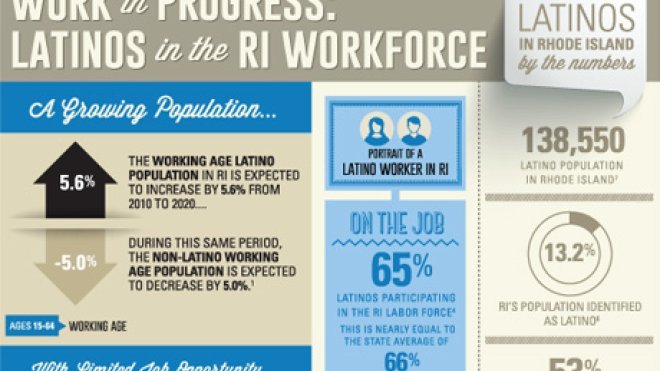LPI Data: Latino Population to Sustain Future Workforce, but is Rhode Island Ready?
Infographic from RWU's Latino Policy Institute shows that Latinos play bigger role in State's labor force but need opportunity to close education, skills gaps

PROVIDENCE, R.I., – As the fastest growing ethnic group in Rhode Island, Latinos will play a more prominent role in the future of the state’s workforce and economic growth, according to an infographic released today by the Latino Policy Institute (LPI) at Roger Williams University and The Economic Progress Institute.
While the working age Latino population, defined as ages 16 to 64, is expected to increase by 5.6 percent by 2020, this demographic faces a number of challenges to realize their professional potential, including overcoming common employer misconceptions about English fluency. The infographic reveals that nearly three out of four Latino workers in Rhode Island speak English well, or as their first language. The findings also debunk the myth that Latinos work less than non-Latinos. The data show that Latinos participate in the state’s workforce at the same level as non-Latinos: 65 percent of Latinos are in the state’s current labor force, which is nearly equal to the state average of 66 percent. Beyond workforce participation, the infographic shows that the number of Latino-owned businesses grew almost 70 percent from 2002 to 2007.
“With a median age of 26, Latinos make up a young, growing population in the state, and that represents our future workforce, civic leaders and business developers,” says LPI Director Anna Cano Morales. “Yet, the only way this community can help fuel Rhode Island’s economic development engine is if we provide better access to quality education at all stages of life, so that they can access full-time employment and high-paying or competitive-wage jobs.”
While Latinos represent a young, hard working and entrepreneurial pool for Rhode Island’s employers, they are under-represented in some of the state’s emerging industries, including healthcare and education. Employment among Latinos in Rhode Island has traditionally been concentrated in the manufacturing sector, but job opportunities in this industry have suffered dramatically, given that Rhode Island has lost a larger share of manufacturing jobs than any other state since 1990, at more than 95,000 jobs. The manufacturing sector’s demise, coupled with an economic downturn, resulted in many Latinos having to settle for part-time positions. The infographic reveals that 37 percent of Latinos in Rhode Island are employed part-time involuntarily.
“The growing Latino population is an important segment of the Rhode Island labor force and will become increasingly important in the future,” says Director of the Rhode Island Department of Labor and Training Charles J. Fogarty. “While it is important that all members of our workforce have access to education and skills training, it is particularly important for this emerging workforce, so that Rhode Island may ensure economic prosperity in the long term.”
Kate Brewster, executive director of The Economic Progress Institute, adds: “It is in everyone’s best interests to ensure that our Latino neighbors have access to quality education and skills training across the life spectrum, including higher education and English language services. A skilled and educated workforce is the key to unlocking prosperity for all Rhode Islanders.”
To learn more about the Latino Policy Institute at Roger Williams University, including other recent research and reports published by the LPI, please visit http://www.rwu.edu/about/partnerships-initiatives/lpi.